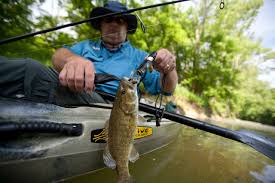 Handle Fish With Care
Handle Fish With Care
By Jerry Kane
Nebraska Game and Parks Commission
Whether you intend to release a fish you catch or you plan to legally keep it, the fish should be handled properly. For the fish’s sake – and yours.
Any caught fish that you do not intend to keep should be returned to the water immediately with as little stress to the fish as possible.
That means minimal handling of the fish.
One thing can make handling fish challenging: Fish are slimy, potentially making grasping and holding them difficult. A fish’s coat of slime is what protects it from diseases and parasites. The more a fish is handled, the more its protective slime coat is compromised. The best way to release a fish without causing damage to it is to remove the hook and release the fish while in the water. There is another option.
Take an old kitchen towel with you fishing and soak it. When you catch a fish, cradle the fish in that wet towel. It not only will let you get a good grasp on the fish and prevent possible punctures from fish spines, but it will protect the fish and its slime coat. Remove the hook while holding the fish and then release the fish back into the water.
For removing hooks from fish, use needle-nose pliers or forceps. If you plan on releasing all your fish, use the pliers to bend down the barb on the point, making hook removal easier.
Another tool you can use is a net made of fish-friendly material that minimizes stress on fish. “The best fish handling is to keep a fish in the water as much as possible,” according to Daryl Bauer, fisheries outreach program manager for the Nebraska Game and Parks Commission. “Keep the fish in the water, handle them in the water, remove hooks, snap a photo, let ’em go.”
On the other hand, if you want to harvest some fish for a meal, there are ways to handle that. A bucket of water or stringer will keep fish for a short time, otherwise take a cooler of ice to the lake. Place the caught fish on ice immediately.
“Fish are a perishable food product and the quality of the meal is only as good as the handling of the fish after the catch,” said Larry Pape, aquatic education specialist Game and Parks. “If possible, fish should be kept alive until just before cleaning.”
If you are just getting into fishing and want more details on planning a fishing adventure, a helpful resource for all things beginner is Game and Parks’ Going Fishing Guide, available at OutdoorNEbraska.gov/howtofish.
If you want to take a new angler fishing and become eligible to win prizes, register for the Take ’em Fishing Challenge at OutdoorNebraska.org, where fishing permits also are available for purchase.


 Advertising
Advertising